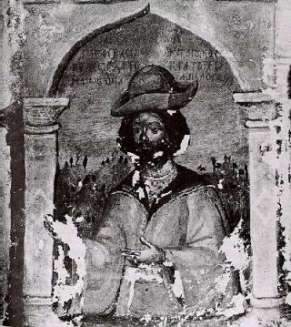|
|
|
Michael VIII Palaeologus born in 1225, belonged to a great aristocrat family. His father Andronicus Palaeologus was
"Megas Domestikos" and governor of Thessalonica, Michael was well educated by Georgios Akropolitis.
In the age of just 21 years, he was commander of Macedonia under his father's orders. He was a great soldier and always had
victories. In 1258 he was crowned emperor of the state of Nicaea in M. Asia. Constantinople that period belonged to Latins.
He fought Latins and his compatriots (Despotato of Epirus) in Pelogonia (Monastirion) 1259, and also in Veratio. He captured
prisoner Goulielm Vileardouine prince of Peloponessus. This had as result the liberation of castles of Mystras,
Monemvasia and others in Peloponessus.
In 1261 he made treaty with Genova (Treaty of Nimphaion) in order to help him retake Constantinople.
In 25 July 1261 his general Alexios Stratigopoulos, in the night, entered in the City suddenly. Latin emperor
Valdouin hastily left his palace, and went on a Venetian ship to Evoia. The City, after 57 years of Latin occupation
belonged to the greeks again. In 15 August 1261, Michael VIII Palaeologus entered in Constantinople from the "Golden Gate",
the gate that was used from emperors after a victory. Latins had pillaged the city, destroyed many of masterpieces of
Fidias, Praxitelis and Lysippos and had converted the churches to stables. The Vlachernes Palace was dirty and deserted.
The empire after the 4th crusade had weakened and had already lost her glory of the past. The Christians of the west
destroyed as they could the Christians of the east who now had to face a new threat from Asia.
Michael rebuilt many of the city's walls, organized the navy and the army. But the commerce was in the hands of Italians
from Genoua, Venice and Piza. Michael had to face Turks from the east, Slavs from the north and Latins from the west.
Latins prepared a crusade to retake Constantinople from the "schismatic Greeks". Charles I, Angevin was the leader of this
idea. So Michael tried hard to unify the two churches under the pope, in order to avoid the war agains latins. As always the
Orthodox church was against this union.
In 1281, Michael defeated Charles I Angevin in Veratio, when he attempted to enter Macedonia. Michael fomented a plot by
Sicilian rebels in 1282 - the so-called Sicilian Vespers - which finally turned the tide in his favour. Sicilian citizens
torched the latin ships in the harbour of Palermo (Panormos) and the crusade never took place. Constantinople was again
saved from the enemy. He died the same year on a campaign in Thrace.


